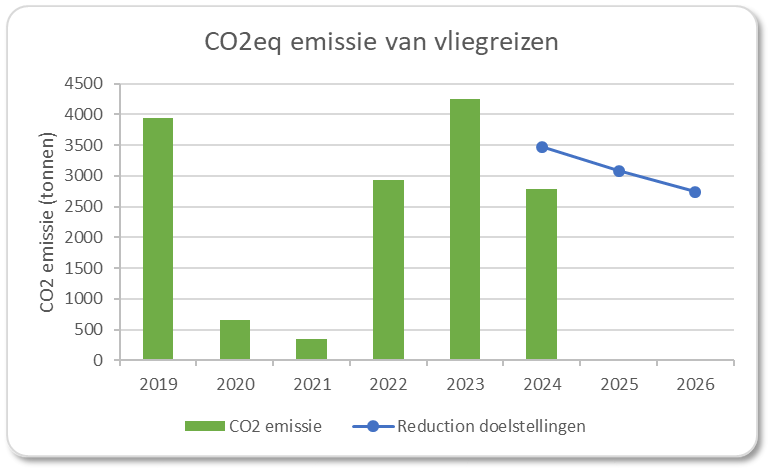UG on track to achieve ambition of 30% CO2 reduction of air travel
Every year, the amount of air travel by UG staff is recorded. This data is bundled and combined in a report by the Green Office. Did you know that UG staff have flown a total of 17 million kilometres in 2024? That is the equivalent of 426 times around the world.
The report provides a clear overview of how much is flown and where to. The data is broken down per faculty or service and presented in fact sheets.
Why is flight data collected?
Organisations such as the UG must keep track of their CO2 emissions every year. A large part of the UG's CO2 emissions are caused by air travel. In order to work towards a CO2-neutral university in 2035, the Board of the University adopted the Sustainability Roadmap 2021-2026 in 2021. The Roadmap consists of UG-wide ambitions and objectives in the field of sustainability. One of the objectives in the Sustainability Roadmap is to reduce CO2 emissions from air travel by 30% (compared to the reference year 2019).
CO2 emissions from air travel
During the corona pandemic, the number of travel movements almost came to a standstill. From 2022, the number of foreign business trips increased again. For short distances (up to 9 hours by train), people travel by train, but for longer distances, many people fly again, with a peak in the number of flights in 2023. As of 2024, a so-called CO2 cap has been introduced for each faculty and service. This CO2 cap will be reduced by 11% each year in order to achieve the target of a 30% reduction in 2026.
Flight data in 2024
In 2024, there was a 33.7% decrease in the number of flight kilometres compared to 2023. As a result, CO2 emissions from air travel decreased by 34.5% compared to 2023. This decrease means that the UG has achieved its CO2 reduction target for 2024 and is on track to achieve its ambition for 2026.

CO2 compensation
Since emissions from flying cannot be reduced to zero, the UG will compensate for the emissions that still occur from air travel. On the advice of four UG scientists, it was decided to opt for a temporary compensation strategy in 2026 and 2027 via the Climate Neutral Group.
Please note that the collected flight data do not cover student travel movements (for example for Erasmus+ and Marco Polo). This data is not available.
More news
-
15 September 2025
Successful visit to the UG by Rector of Institut Teknologi Bandung
